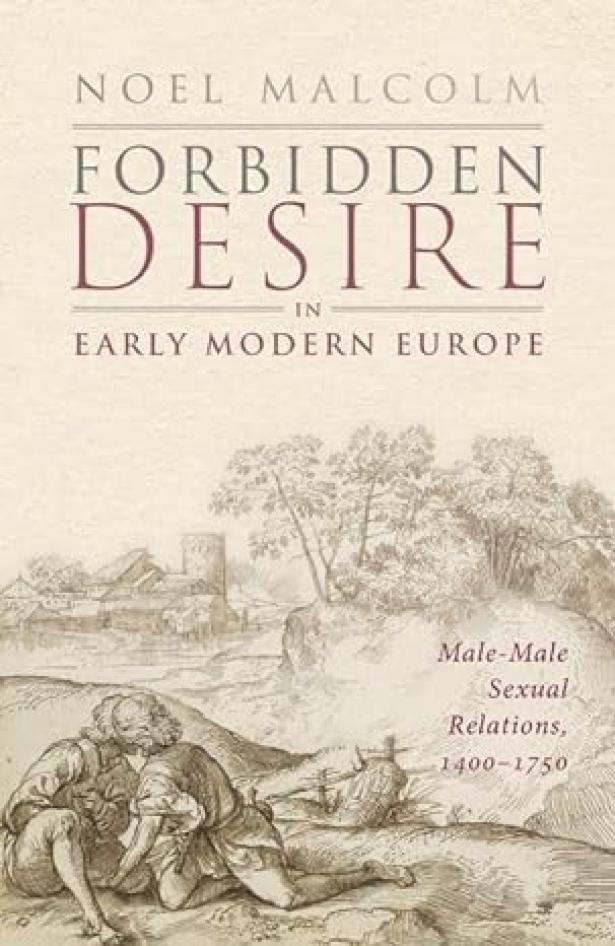Forbidden Desire in Early Modern Europe: Male-Male Sexual Relations, 1400-1750
Noel Malcolm
Oxford University Press
ISBN-13: ?978-0198886334
Forbidden Desire, Noel Malcolm’s sober and footnote-heavy history of male homosexuality between 1400 and 1750, has some friskier bedfellows: on Amazon it shares its title with a slew of hairy chested bromances, one or two Sapphic romps, and a sulphurous tale about a witch’s affair with a tormented demon. Against such competition, Malcolm fields a cast that includes lustful Turkish potentates, predatory Catholic priests, corruptible scullions and smooth-cheeked choristers, together with two English kings who allegedly fooled around with virile young favourites. But mostly the sodomites, as Malcolm grimly insists on calling them, are left to satisfy their desires in private; the historian’s concern is the forbidding religious commandments that the same-sex couples flouted and the crazily brutal penalties imposed by laws that purported to uphold the divine order of the universe.
Sex here seems to be followed, almost automatically, by excruciating death. In the 15th century, sodomy in Venice was punished by decapitation, after which the corpses of the malefactors were burned to ensure that no trace of them remained. Because it was unlawful to kill an ordained man, a lecherous cleric was locked in a cage in the Piazza San Marco and left to starve in full view of a gloating populace. In Florence a boy aged 15 was castrated on the scaffold, then fatally sodomised with a hot iron poker. A Dutch youth placed in the pillory was pelted with filth and bombarded with stones, which finally finished him off. Others were sentenced to row themselves to death as galley slaves; the lucky ones, in a bizarre act of mercy, had their noses, not their heads or penises, chopped off.
The moral panic whipped up by these prosecutions often concealed squalid financial or political motives. A French assault on the secretive Knights Templar in the 14th century used sodomy as an excuse for confiscating their wealth. In Peru, Indigenous tribes were accused of the same vice to justify the rampages of the Spanish conquistadors. In case you wonder why Christian Europe was so tightly clenched against intrusion, Malcolm mentions an abstruse psychological hang-up known as “xenohomophobia”: men who opted for a passive role in sex were considered treacherous because their preference signalled “religious and military penetrability”. Perhaps the mad metaphor can be stretched to explain Trump’s border wall, designed as a protective plug for one of America’s orifices.
As Malcolm demonstrates, this paranoid bigotry derived from a misreading of scripture. The ungodly city of Sodom is condemned because its inhabitants committed a particularly abominable sin, but the Bible does not specify that this peccadillo was “male-male sexual intercourse or desire”. Patristic commentators filled in the blank by huffing and puffing about a practice they called “unnameable”; warning that if uttered aloud it would “pollute the mouth of the speaker and the ears of the listener”, which left the devout free to luridly fantasise about a love that dare not speak its name. Sodom remained so conveniently obscure that when the Marquess of Queensberry invoked it to denounce Oscar Wilde for corrupting his son, he could not remember how to spell the word: the card he left at Wilde’s club addressed him as a “posing Somdomite”. Thanks to one of Malcolm’s learned asides, the synonymous charge of buggery also vaporises into hot air. The term comes from the French “bougre”, originally meaning “Bulgar”’, which refers to “the Bogomil dualists of the Balkans”, Gnostics who shunned procreation in order to reject the material world. Vulgarised in English, Bulgaria turned into buggery, an all-purpose expletive that reduced the religious anathema to an exercise in name-calling.
Announcing that he has “come to this subject with no personal investment in it”, Malcolm resists the wishful thinking of historians who double as gay activists and back-project “anachronistic sexual significances” on to blameless friendships between medieval men. Academic neutrality is fair enough, but I find it hard to remain dispassionate about the pious carnage his book unearths. Christianity’s epochal campaign to forbid desire was a war against humanity, and it is now belatedly concluding in defeat.
Peter Conrad is an Australian-born academic specialising in English literature.


Spread the word